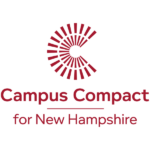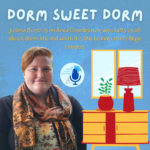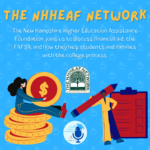Related Content

Events
Rural Conversations

Navigate: A Road Map for New Hampshire S

Podcasts
Dorm Sweet Dorm

Podcasts
Solidly Scholarly

Podcasts
Legally Speaking

Podcasts
The NHHEAF Network

Podcasts
Hairs to You

Podcasts
Admissions Advice

Podcasts
United We Serve

Podcasts
Talking TRIO
Facilitating Conversations for Change: Leading Constructive Dialogues
This recorded session offers ideas and tools to facilitate constructive conversations on campus and lead inclusive dialogues with students, staff, and faculty. The session draws on Practicing Democracy: A Toolkit for Educating Civic Professionals by Nick Longo (coming early 2023), a guide on using civic prompts to educate future citizen professionals. This recorded session is available to Campus Compact members only. Learn how to get started with a compact.org user account to access the recording. Watch the recording →
Workshop Recording: Creating Space for Democracy: Methods for Promoting Civil Discourse in Higher Education
This video recording of Campus Compact’s national workshop offers ideas and practices for promoting free spaces for civil discourse in classroom, student life, and community settings. How can educators use civil discourse to address increasing polarization and free speech controversies on campus? Drawing on lessons from Creating Space for Democracy (Stylus/Campus Compact/AAC&U), this workshop introduced various methods of dialogue and deliberation, including case study examples from leading dialogue practitioners. Moderator: Nicholas Longo, Campus Compact Deliberative Dialogue Fellow, Professor in the Department of Global Studies & Faculty Fellow for Engaged Scholarship with the Center for Teaching Excellence, Providence College Panelists: Sara Mehltretter Drury, Vice…
Nonpartisan Campus Election Resources
Campus Compact has compiled nonpartisan election resources that provide valuable guidance for students and others on campus. Resources range from government requirements for distributing voter registration forms on campus to information specific to upcoming elections in New Hampshire. Distributing Voter Registration Forms on Campus This Dear Colleague letter, from the Acting Assistant Secretary for the U.S. Office of Postsecondary Education, outlines federal requirements and resources for campus voter registration. Read more → Education for Democracy Knowledge Hub This compilation of resources from national Campus Compact includes a plethora of guides and organizations for students, as well as resources on teaching…
Food Insecurity on College Campuses: Responding to Our Students’ Needs
Responding to Our Students’ Needs: Strategies for the Future is a powerful presentation about food insecurity among students, and what colleges and universities can do to help. The presentation is by Lauren Walizer, senior policy analyst at the Center for Law and Social Policy (CLASP), speaking at the 2000 NHCUC Higher Ed Summit, sponsored in part by CCNH. Download the PPT Download the PDF
Equity-Based Service-Learning
This Knowledge Hub from Campus Compact allows students to delve deeper and enrich their service-learning experience by looking at larger issues, beginning with the question of “Why.” Why are these communities in need? Why are these communities similar in demographics regardless of where they are located across the country? Why have the needs been consistent for several decades? Asking these questions gives students the opportunity to understand the power dynamics within the communities they seek to serve. This element of asking difficult questions magnifies the service-learning experience and enables them to develop a critical lens and a sense of civic…
Glossary of Campus Engagement Terms
Below you will find definitions to help understand and educate professionals interested in service-learning, civic engagement and the scholarship of engagement. What is Service-Learning? Service-learning means a method under which students learn and develop through thoughtfully organized service that: is conducted in and meets the needs of a community and is coordinated with an institution of higher education and with the community; helps foster civic responsibility; is integrated into and enhances the academic curriculum of the students enrolled; and includes structured time for students to reflect on the service experience. American Association for Higher Education (AAHE): Series on Service-Learning in…
Inclusive Excellence Toolkit
This toolkit assembles resources from a statewide symposium, Project Inclusion New Hampshire: Assessing and Enacting a Commitment to Diversity, Inclusion, and Equity on Campus. The symposium, held in June 2016, explored strategies for making higher education more inclusive in ways that benefit all members of the campus community. Project Inclusion was made possible through support from the Lloyd G. Balfour Foundation, Bank of America, N. A., Trustee. Documentation of the materials found on this page was made possible through the generous support of the New Hampshire Endowment for Health.
NH Colleges and Universities Help Communities During Covid-19
In times of hardship it is critical to come together and support each other and those in need. New Hampshire’s colleges and universities are doing just that. Initiatives to support communities during Covid-19 range from providing essential medical equipment to designing and producing masks to organizing food drives and donations. If you know of a higher education institution doing work that is not listed here, please share with CCNH staff so we can highlight the incredible work being done by NH institutions in their local communities.Great Bay Community College is working to meet the needs of students at risk of…
COVID-19 College Resource page
Information on staying an engaged campus in the midst of COVID-19. Resources gathered from around the country.
Podcast: Academic Freedom & Institutional Autonomy
In this podcast, Marisol Morales, vice president for network leadership at the national office of Campus Compact, is joined by contributors from the Council of Europe’s publication, Academic Freedom, Institutional Autonomy, and the Future of Democracy. Guests include Ligia Deca, advisor to the president of Romania, Jon Alger, president of James Madison University and member of the Campus Compact Board of Directors, Sjur Bergan, head of the education department of the Council of Europe, and Ira Harkavy, associate vice president and founding director of the Barbara and Edward Netter Center for Community Partnerships at the University of Pennsylvania and chair…
Student Voting Resources
A compilation of student guidelines and hands-on resources from the national Campus Compact office. Includes resources for making your vote as a student count and for helping ensure others can recognize their right to vote as well.
Queen City Serves
The Queen City Students Serve initiative is in partnership with the following NH higher education institutions.Families in Transition-New Horizons Granite United Way Sleep In Heavenly Peace Hillsborough County Chapter Pass Along Project GEAR UP Manchester Big Brothers Big Sisters Friends of the Manchester Animal Shelter Boys and Girls Club of Manchester The Granite YMCA Aimee Kereage Amiee is the Director of Community Impact at the Granite United Way. She partners often with the Manchester community on a multitude of issues. Since the pandemic her efforts have focused on making sure that families and students in the Manchester community were fed…
Diversity Conversation Slides
Marisol Morales, VP of Network Leadership, National Campus Compact, facilitated our diversity conversation. These are the slides from her presentation.
Strengthening 2- to 4-Year Transfer Pathways
Building coherent, smooth, and clear 2-year to 4-year transfer pathways can impact student access, persistence, and success. Transfer student success pulls on several areas of the institution including admissions, student support, housing, faculty, advising, and more. A comprehensive approach to creating transfer pathways and articulation agreements that incorporate staff, faculty, and administrators from both the 2-year and 4-year institutions is essential. One of a wide range of knowledge hubs developed by Campus Compact, Strengthening 2- to 4-Year Transfer Pathways offers resources, models, and information from across the country.
Supporting Retention through Food and Housing Security
While civic engagement traditionally looks at the issue of hunger outside of the institution, these initiatives can look inward to the campus community to support work addressing issues of campus food and housing insecurity. These issues can have a major impact on student retention and success. Community and civic engagement offices can work to align themselves with on-campus efforts to support at-risk students and the wider community of the campus. These efforts include raising awareness of the challenges many college students face regarding food and housing insecurity and working to address those issues. One of a wide range of Knowledge…
Creating a Service Year on Campus
The incorporation of a year of service into the post-secondary education experience helps prepare students to complete their degrees, secure meaningful employment, and become lifelong engaged citizens. Service years in higher education have the power to attract students, enliven education, and put graduates on pathways to careers. This knowledge hub provides resources for campus stakeholders interested in supporting alumni of service year programs on their campus, creating a service year connected to academic credit, or providing opportunities for faculty and staff to support service initiatives. One of a wide range of knowledge hubs developed by Campus Compact, Creating a Service…
Building Interfaith Cooperation through Civic Engagement
Religious and ethical convictions are a driving force behind people’s motivation to serve others. Ignoring these convictions misses a valuable opportunity to connect values to action. As America continues to diversify, opportunities for conflict around religious difference abound. However, there is also ample opportunity for students to engage in cooperative and healthy ways by exploring the shared values between traditions–– specifically through service to their communities. This knowledge hub provides resources for civic engagement and service-learning professionals interested in fostering opportunities for students to engage their religious, spiritual, and secular values in their service work. One of ten knowledge hubs…
Applying STEM to Real-World Issues through Service-Learning
Students in the United States are often found to underperform academically in science, technology, engineering, and math (STEM). As a result, they are not choosing to pursue careers in STEM fields at a rate needed to meet expected demand in the labor market–thus creating a skills gap. One way to address the STEM skills gap is for higher education to work with K-12 schools to get children more interested in STEM fields by linking STEM learning to real-world issues. This approach can also help struggling students perform better in STEM areas. This will, in turn, create better-performing students who are…
Increasing Student Political Participation
While many parts of fostering civic engagement in a campus environment are hard to measure, the rate of student voter registration and student voting are two very easy variables to quantify, and are in fact publicly available data if you know where to look. And of course, if you’re not registered, you can’t vote. Different inputs that affect the rate student voting at a given institution highlighted in this guide are more complicated, and will vary substantially from campus to campus depending on the student population type. To increase the rate of student voter registration and student voting on your…
 -->
-->
